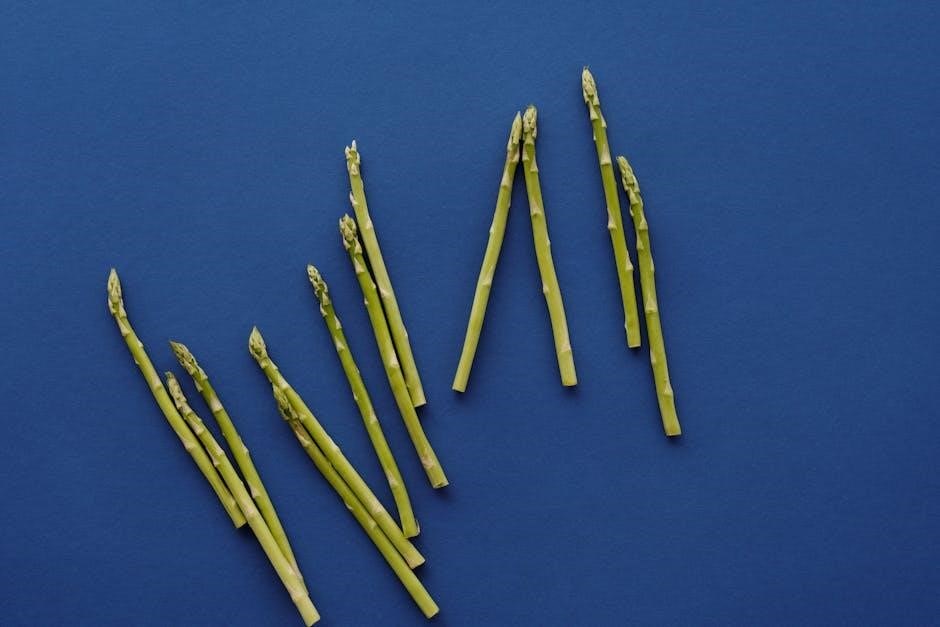
A low protein diet plan is designed to reduce kidney strain and manage chronic conditions like CKD․ It focuses on balanced nutrition while limiting protein intake, requiring careful monitoring and professional guidance to ensure health benefits․
1․1 What is a Low Protein Diet?
A low protein diet is a dietary plan that restricts protein intake to specific levels, tailored to individual health needs․ It is often recommended for individuals with kidney issues to reduce kidney strain․ The diet focuses on balanced nutrition, emphasizing foods low in protein while ensuring essential nutrients are met․ Consulting a healthcare provider is crucial to determine appropriate protein limits and maintain overall health․ This structured approach helps manage conditions like Chronic Kidney Disease (CKD) and promotes well-being by balancing protein consumption without compromising nutritional needs․
1․2 Importance of a Low Protein Diet Plan
A low protein diet plan is crucial for managing health conditions like Chronic Kidney Disease (CKD) and reducing kidney strain․ By limiting protein intake, it helps decrease the workload on kidneys, slowing disease progression․ This diet also aids in preventing complications such as muscle wasting and low albumin levels․ A well-structured plan ensures adequate nutrition while adhering to protein restrictions․ Consulting a nephrologist or renal dietitian is essential to tailor the diet to individual needs, promoting overall health and well-being․ This approach is vital for maintaining nutritional balance and managing chronic health issues effectively․
Benefits of a Low Protein Diet
A low protein diet reduces kidney strain, aids in managing Chronic Kidney Disease (CKD), and supports weight management goals, promoting overall health and well-being effectively․
2․1 Reducing Kidney Strain
A low protein diet helps reduce kidney strain by minimizing the amount of waste products, such as urea, that the kidneys must filter․ This is particularly beneficial for individuals with kidney issues, as it lessens the workload on these vital organs․ By consuming fewer proteins, the kidneys don’t have to work as hard, which can help prevent further damage and slow the progression of kidney disease․ This approach is often recommended by healthcare professionals to support renal health and overall well-being․
2․2 Managing Chronic Kidney Disease (CKD)
A low protein diet is essential for managing Chronic Kidney Disease (CKD), as it reduces the strain on the kidneys and slows disease progression․ By limiting protein intake, individuals with CKD can help preserve kidney function and prevent complications․ The diet is tailored to the severity of the disease, ensuring adequate nutrition while minimizing waste buildup․ Regular monitoring with a healthcare provider is crucial to adjust the diet plan as needed․ This approach supports long-term kidney health and improves overall quality of life for those living with CKD․

2․3 Promoting Weight Management
A low protein diet can aid in weight management by focusing on nutrient-dense foods and controlling calorie intake․ Emphasizing vegetables, fruits, and whole grains helps reduce overall consumption while maintaining satiety․ Portion control and mindful eating are key strategies to avoid overeating․ This dietary approach not only supports weight loss but also promotes a healthier lifestyle, contributing to improved metabolic health and reduced risk of obesity-related conditions․ Balancing macronutrients appropriately ensures that weight management is achieved without compromising essential nutrient intake․

Key Components of a Low Protein Diet Plan
A low protein diet plan focuses on protein limits, food selection, and meal balance․ It emphasizes whole grains, vegetables, and healthy fats while minimizing high-protein foods․
3․1 Understanding Daily Protein Limits
Daily protein limits are crucial for a low protein diet plan, typically ranging from 0․6 to 0․8 grams per kilogram of body weight․ This restriction helps reduce kidney strain, especially for those with chronic kidney disease (CKD)․ However, it’s important to avoid excessive reduction, as it can lead to malnutrition and muscle wasting․ Consulting a nephrologist or dietitian is essential to determine the right intake based on individual health needs․ Balancing protein intake ensures the body gets enough nutrients while minimizing strain on the kidneys, making it a cornerstone of managing kidney health effectively․
3․2 Foods to Include and Avoid
A low protein diet plan focuses on selecting foods that minimize kidney strain while providing essential nutrients․ Include low-protein alternatives like whole grains, vegetables, and fruits․ Lean meats and plant-based proteins should be consumed in moderation․ Avoid high-protein foods such as red meats, dairy products, and legumes․ It’s important to balance the diet to ensure adequate nutrition while adhering to protein limits․ Consulting a renal dietitian can help tailor food choices to individual needs, ensuring the diet remains healthy and sustainable long-term․
3․3 Role of Protein Quality in the Diet
In a low protein diet, the quality of protein is as important as the quantity․ High-quality proteins, such as lean meats, fish, and plant-based options like legumes, provide essential amino acids while minimizing waste products․ These proteins are easier for the body to process, reducing kidney strain․ It’s crucial to choose proteins that are low in saturated fats and sodium to maintain overall health․ Additionally, plant-based proteins like tofu and quinoa are excellent alternatives, offering balanced nutrition without excessive protein intake․ Consulting a dietitian can help optimize protein quality for individual health needs․
Meal Planning Strategies
Effective meal planning involves balancing low-protein foods, avoiding high-protein sources, and ensuring nutrient-dense options․ Consulting a dietitian helps tailor plans to individual health needs and preferences․
4․1 Sample Meal Plans for a Week
A sample 7-day low protein meal plan includes breakfast, lunch, dinner, and snacks․ Breakfast options like oatmeal with fruit or whole-grain toast with avocado are ideal․ Lunches may feature salads with low-protein dressings or vegetable stir-fries․ Dinners could include roasted vegetables, quinoa, or couscous․ Snacks such as fresh fruits, nuts in moderation, or veggie sticks with hummus are recommended․ Avoid high-protein foods like red meat, dairy, and legumes․ Ensure meals are balanced, focusing on whole grains, vegetables, and healthy fats․ Consulting a dietitian can help tailor these plans to individual needs, especially for conditions like CKD․
4․2 Healthy Snack Options
Healthy snacks for a low protein diet include fresh fruits like apples or berries, veggie sticks with low-protein hummus, and whole grain crackers․ Small portions of nuts or seeds, such as almonds or pumpkin seeds, can be included in moderation․ Air-popped popcorn without added cheese or butter is another low-protein option․ Smoothies made with fruits and low-protein yogurt alternatives are also a great choice․ Avoid high-protein snacks like dairy, lean meats, or legumes․ Always opt for snacks rich in fiber and healthy fats to stay satisfied without exceeding protein limits․ Consulting a dietitian can help ensure snacks align with your dietary goals․

Monitoring and Adjustments

Regular tracking of protein intake and health markers ensures the diet remains effective․ Adjustments may be needed based on blood work and kidney function, guided by a healthcare professional․
5․1 Tracking Protein Intake
Tracking protein intake is crucial for maintaining a low protein diet․ Use a food diary or mobile app to record daily consumption, ensuring it aligns with recommended limits․ Regularly review meals to avoid exceeding protein thresholds, which can strain kidneys․ Accuracy is key, as even small portions of high-protein foods can add up quickly․ Consulting with a renal dietitian can provide personalized guidance and help prevent malnutrition while managing conditions like CKD effectively․
5․2 Regular Health Check-Ups
Regular health check-ups are essential when following a low protein diet․ They help monitor kidney function, albumin levels, and overall nutritional status․ Blood tests and urine analysis can detect any imbalances early, allowing adjustments to the diet plan․ Frequent consultations with healthcare providers ensure the diet remains effective without causing malnutrition․ These check-ups also help in managing chronic conditions like CKD, preventing complications, and maintaining long-term health․ Consistent medical supervision is vital for safely adhering to a low protein diet and achieving its benefits․

Challenges and Solutions
A low protein diet can lead to malnutrition and cravings․ Consulting a nephrologist or dietitian helps manage these challenges effectively, ensuring proper nutrition and adherence to the plan․
6․1 Managing Protein Cravings
Protein cravings can be challenging on a low protein diet․ To manage them, incorporate plant-based protein sources like legumes and tofu, which are lower in protein but nutrient-rich․ Additionally, focusing on whole, unprocessed foods such as vegetables, whole grains, and healthy fats can help reduce cravings․ Staying hydrated and practicing mindful eating also play a role in curbing unnecessary protein intake․ Consulting with a dietitian can provide personalized strategies to meet nutritional needs while minimizing cravings effectively․
6․2 Ensuring Adequate Nutrition
Maintaining adequate nutrition on a low protein diet requires careful planning․ Focus on nutrient-dense foods like vegetables, whole grains, and fruits, which provide essential vitamins and minerals․ Incorporate plant-based proteins such as beans and lentils to meet protein needs without overconsumption․ Healthy fats from sources like avocados and nuts are also crucial for overall health․ Regularly consulting with a healthcare provider or dietitian ensures that the diet remains balanced and meets individual nutritional requirements, preventing deficiencies and supporting long-term well-being effectively․
A low protein diet plan offers significant health benefits, particularly for those managing kidney disease․ Proper planning and professional guidance are essential to ensure effectiveness and safety․

7․1 Final Thoughts on a Low Protein Diet
A low protein diet can be highly beneficial for managing health conditions like CKD, but it requires careful planning and consultation with healthcare professionals․ While it reduces kidney strain and aids in weight management, ensuring adequate nutrition is crucial․ Balancing protein intake with essential nutrients helps maintain overall health without compromising dietary needs․ It’s important to stay informed and adapt the plan as needed, considering individual health requirements and lifestyle factors․ Regular monitoring and adjustments are key to long-term success and well-being․
7․2 Importance of Consulting a Healthcare Professional
Consulting a healthcare professional is crucial when adopting a low protein diet․ They can tailor the plan to your specific health needs, ensuring it addresses conditions like CKD effectively․ A nephrologist or dietitian will calculate your protein limits and monitor progress․ Without professional guidance, there’s a risk of malnutrition or inadequate nutrient intake․ Regular check-ups help adjust the plan as needed, ensuring long-term safety and effectiveness․ Their expertise guarantees a balanced approach, making the diet both beneficial and sustainable for overall health․